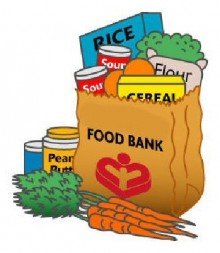I often pick up on interesting exchanges from the Commons. However, this week I came across one which went way beyond ‘interesting’ and well into the territory of ‘he can’t possibly have really just said that’.
I’ve written before about Foodbanks, and the appalling gall of David Cameron in trying to claim the exponential rise in their numbers as an expression of his ‘Big Society’. Cameron has also been incredibly disingenuous when criticised about this rise, claiming that
The use of food banks went up tenfold under the last Labour government.
As Channel 4′s Full Fact has pointed out, the tenfold increase during 6 years under the last Labour government in the number of people receiving help from Foodbanks (by around 36,000 to 40,898) is dwarfed by the increase of 87,799 (to 128,697) that took place in just the first 2 years of the coalition government.
But even that is nothing compared to what happened in the most recent year, 2012-13. The already massive number of over 128,000 almost tripled in a single year to almost
350,000
All this is bad enough – but it’s not what I’m talking about as unbelievable. To claim these numbers as a success should be unbelievable – but it’s all too easy to believe of David Cameron.
Here’s what made my jaw drop. It’s a passage from the Hansard record of Commons debates last Tuesday, 14 May 2013. During a debate on the cost of living, Labour MP Huw Irranca-Davies challenged the government on the exponential rise in the number of people relying on help from Foodbanks:
Against the glowing backdrop that the Secretary of State paints, why do I now have a food bank in every single village in my constituency when there was only one three years ago? Why has there been a quadrupling of food banks under this Government? His record cannot be that good, given the backdrop of the inexorable rise of food poverty.
As we’ve seen, Mr Irranca-Davies actually understated the situation. The latest figures were released at the end of April, so he should have said that Foodbank use has gone up almost nine-fold under this woeful government. Close to Cameron’s misleading claim of a tenfold increase under Labour, but 9 times a far larger number to begin with. Perhaps Mr Irranca-Davies didn’t have the latest numbers, but it’s a pity he missed the opportunity to confront the government with its even greater culpability.
Government minister Ed Davey gave his staggering response:
People who run food banks are doing an extremely good job and deserve credit for their work. However, it is completely wrong to suggest that there is a statistical link between the Government’s benefit reforms and the provision of food banks. It is good that people are helping others. I hope the hon. Gentleman supports that.
Not only does Davey repeat Cameron’s hubris by claiming the increase in Foodbank use as a social good – he claims that the rise has nothing to do with the government’s benefit ‘reforms’.
I have news for Mr Davey. The number of people coming to my local Foodbank for help doubled overnight when the government’s latest ‘reforms’ kicked in at the beginning of April, including the cancellation of the ‘crisis loan’ programme.
There can no doubt whatever in the mind of any reasonable, honest person that the government’s persecution and impoverishment of those who are already poor and disadvantaged is directly responsible for the massive increase in the number of people in such desperate straits that their only option is to accept the humiliation of admitting to strangers that you literally have no food to put on the table for yourself or your family.
That ordinary people have galvanised themselves to save others from starvation is amazing, and heartwarming.
That our government is increasing the number of people who need saving by around 350 people per day for the whole of last year (a number that unquestionably continues to accelerate) should have the Tories and LibDems cowering in shame – and make them unelectable forever. Instead the government is claiming ‘It’s nothing to do with us, guv‘.
Anyone who would think for even a nanosecond of voting for either party in the next general election needs either their head or their heart examined – or both.







